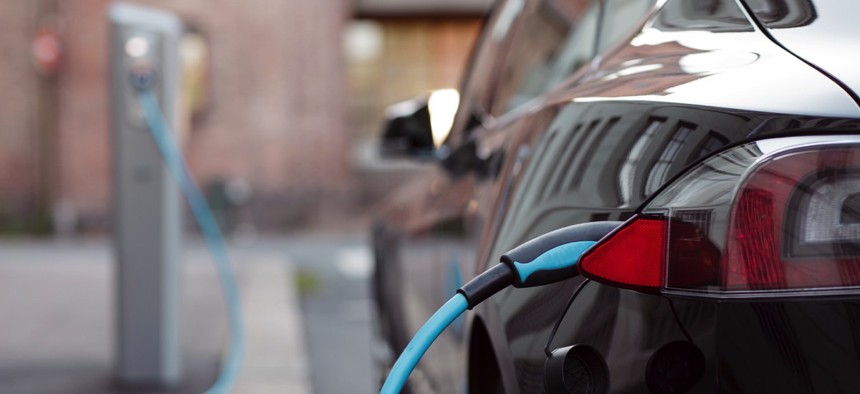Policy Experts: States and Localities Need More Electric Vehicle Incentives

Deployment remains in the early stages in many places.
WASHINGTON — Policy experts on Tuesday called for increased federal incentives to push more state and local governments toward electric vehicle fleets and renewable energy sources.
California’s top priority is maintaining and repairing deteriorating infrastructure, but in the process the state is attempting to align transportation spending with environmental goals, said Dan Sperling, a member of the California Air Resources Board, during a House transportation committee hearing.
While restructuring how the federal government funds transportation is part of that, Sperling said, so is electrification, automation of vehicles and shared mobility.
“Our top priority should be to reform federal and state policies to incentivize change to encourage innovation to flourish,” Sperling said.
The ideal result in California would be more passenger miles traveled and fewer vehicle miles traveled, more mobility options like electric scooters and bike sharing, more investment in protected lanes, and the electrification of all passenger and most freight vehicles, he added.
Automakers have struggled to make long-term investment plans around electric vehicles because federal policy has vacillated on which alternative fuels it prefers—battery electric is the current favorite, said Thomas Lyon, an economics professor at the University of Michigan.
Still, 92 percent of the U.S. transportation sector runs on oil, said Ben Prochazka, vice president of the Electrification Coalition.
“If national oil companies and cartels are controlling the price of oil, then it leaves American businesses and consumers with few choices when oil prices spike or when supply is cut off,” Prochazka said. “And, so I think, if anything, electrifying our transportation sector has got to be part of the solution.”
With state and local EV policies in flux, investments in the early stage of deployment should be bolstered, he added. Specifically, the Electrification Coalition advocates existing federal grants subsidizing EV purchase should be maintained, as should the 30C tax credit funding charging infrastructure.
Expanding Federal Transit Administration low- or zero-interest loans for electric bus adoption or tapping into Volkswagen settlement money will help localities “buy down their cost up front,” said Vicki Arroyo, executive director of the Georgetown Climate Center.
Car companies are already helping electrify forthcoming Uber and Lyft vehicles on their own, Sperling said, so a small amount of EV funding for cities will go a long way.
“Every major car company in the world is fully committed to electrifying. This is not a question any more. They’ve got the supply chains. They’ve got the technology,” Sperling said. “They’re just waiting for either consumers to switch their behavior or incentives to be created, and they’re going to be moving forward in a major way.”
Recently, the Green New Deal proposed by freshman U.S. Rep. Alexandria Ocasio-Cortez, a New York Democrat, has called for aggressive investment in clean energy jobs and infrastructure to reduce carbon emissions.
Recent studies have cast new warnings about climate change, such as a new one published in the journal Nature Geoscience Monday finding that once the atmospheric carbon concentration reaches 1,200 parts per million—possible within the next century at current emissions rates—stratocumulus clouds that help cool the planet could possibly dissipate, intensifying temperature increases, reported Quanta Magazine.
But Republican lawmakers at Tuesday’s hearing expressed concern about passing energy regulations that are too prescriptive and stifle innovation.
“We don’t need sweeping mandates that ignore economic reality and differing needs within our communities,” said U.S. Rep. Sam Graves, a Missouri Republican and the committee’s ranking member. “And that heavy-handed approach, which is envisioned in the Green New Deal, just simply doesn’t and just drives industries and communities right into the very earth we’re trying to protect.”
U.S. Rep. John Katko, a New York Republican, said international incentives are needed because China and developing countries continue to invest in coal plants, while the U.S. cuts emissions.
“The United States doesn’t seem to be the problem,” Katko said. “And so is the solution to increase energy costs in our country, cut jobs, raise taxes on hardworking American families, and jeopardize our strong economy at this point in time?”
Arroyo said U.S. emissions spiked 3 percent in the last year and that the federal government should follow the lead of states and cities making their own clean energy investments.
Some states have implemented popular renewable energy portfolio standards, Arroyo said.
“Many of those states have met and exceeded those standards,” she added.
Dave Nyczepir is a News Editor at Route Fifty and is based in Washington, D.C.
NEXT STORY: Conflict-of-interest charge may sidetrack JEDI






